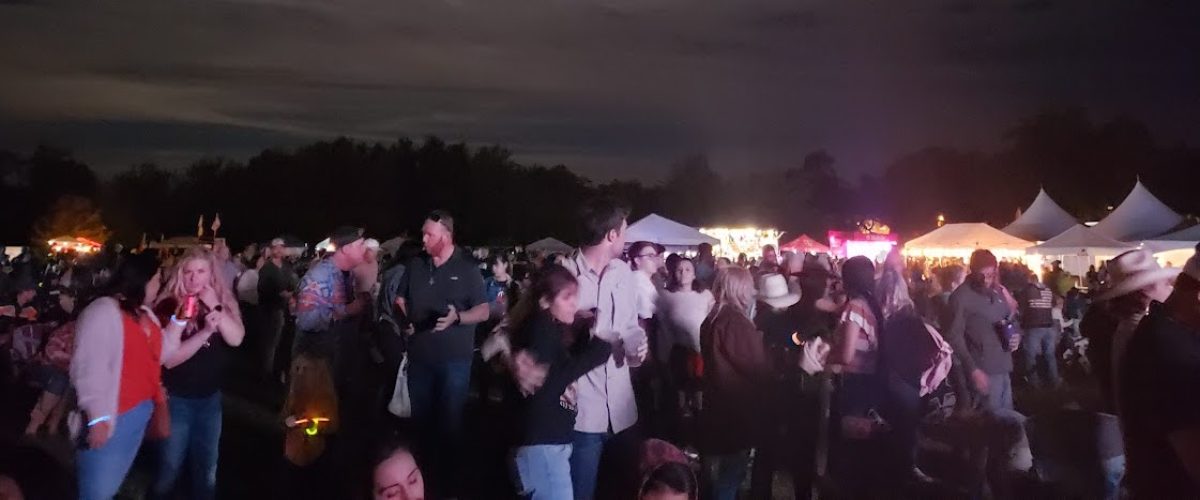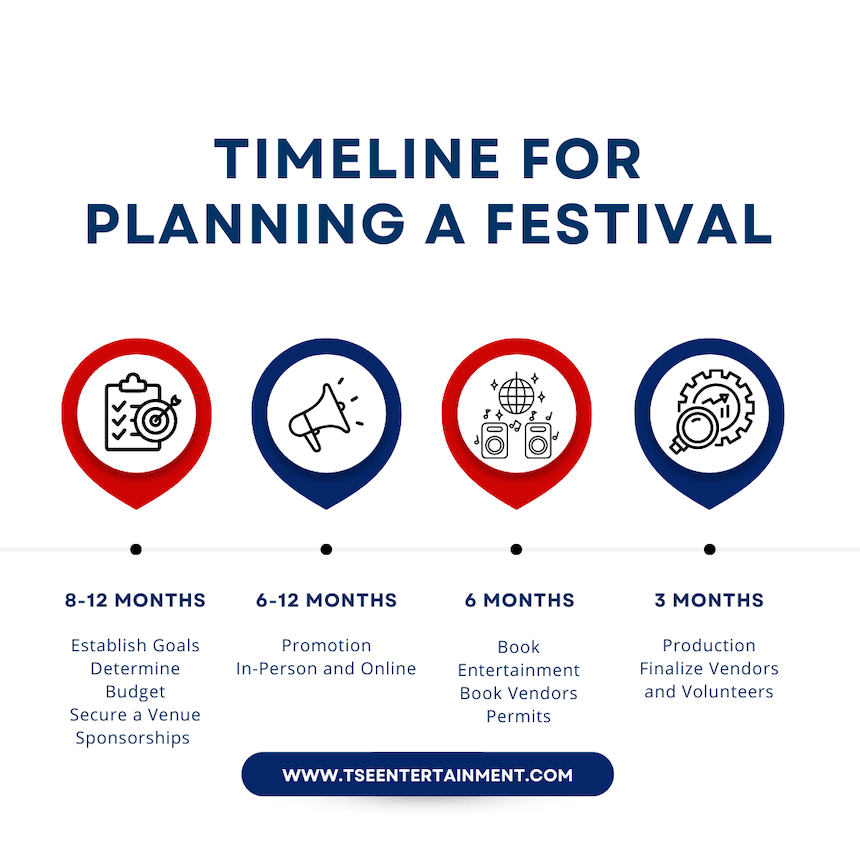Planning a festival and handling all the issues involved in producing a festival is no easy task. With vendors, entertainers, sponsors, and community members, there are a lot of issues to keep track of to ensure a smooth day or weekend of entertainment. In this blog, we will walk you through the process of music festival planning from a year before the event to the day of.
Who knows, maybe someday your festival will make Billboard’s Top 50 Festivals list.
The Earlier You Start Planning a Festival the Better
 8-12 Months Before the Festival
8-12 Months Before the Festival
Getting an early start to planning a festival is imperative to the success of a music or another type of festival. Early planning will ease your mind by minimizing last-minute decisions. It will also ensure that your partners are on board and understand the vision of the event before getting too involved in their own personal roles. One year out from the festival is not too early to start preparation for the steps listed below!
Create goals, objectives and KPI’s (key performance indicators)
Before beginning to book entertainment and getting too excited about the possibilities of what your festival might become, it is important to create goals and measurable key performance indicators for what you want to accomplish with your event. Goals might be related to event success. Objectives for registration and attendance, social media statistics, or monetary returns.
These KPI’s are the measurements by which you will judge the specific success of the components involved with your festival. Knowing what you will measure will go a long way in determining the specific strategies you will use to achieve them.
Determine your Initial festival budget
It is very important to create your budget as a very early step in planning a festival. The budget should be a dynamic document that will change as the planning progresses, sponsors are acquired, quotes arrive, etc.
It will also give you a sense of all the various expenses involved in music festival planning. You can find budget templates online for use in festival event management. As you will see, the entertainment budget only represents a portion of the budget for a music festival.
There are many services and supplies to secure besides the entertainment expenses when planning a festival. It is important to keep in mind expenses such as permits, venue rental, fees, equipment rentals, safety and security expenses, local production, promotion, payroll, and many more.
Secure a venue that fits your festival planning needs
In planning a festival, the “where” is very important. Festivals typically are outdoor events, although other types, e.g., film festivals, are not. Music festivals are often held in open spaces without existing amenities. Multi-day music festival planning requires locating the right space with overnight stay options.
Existing venues that have the amenities needed already in place are booked quickly, so it is imperative to do so about a year in advance. Once the site is locked down, the space issues can help determine your site plan of how much area for specific activities is available and can guide the kind of entertainment the venue will allow.
Getting permits for a festival should be done as soon as a site for the festival is determined. Often the permitting process can be tedious so the sooner you begin the better. By acting early, you will have plenty of time to deal with any issues that may arise during the festival permitting process.
Sponsorship development is often a part of festival production
Acquiring sponsors is not always necessary when planning a festival. Whether to seek sponsors depends on the scope and the financial needs of the festival being planned. However, if you do plan to sell sponsorships, that involves a lot of upfront research to determine the right brands for the demographic targeted to attend your festival. Read more: Event Sponsorship: how to get a sponsor.
Forming relationships with potential sponsors will take time and it’s best to get started early in the festival planning process. This will give you enough time to research and reach out to potential sponsors of all sizes to decide which are a good fit.
You will then need time to reach out to determine which may be interested in having their brand or name associated with the event. It will help to figure out sponsorship deals almost a year in advance so that the terms can be negotiated and solidified before you begin the marketing process.
6-12 Months before the festival
Once the initial festival planning is well underway and you have a date, venue secured and sponsorship sales progressing you are ready for the next step. The next step in planning a festival is development of an event marketing and promotion plan. First time festivals require creating the festival brand from scratch. That requires you to start earlier than one would with an established festival. You will also need a bigger festival promotion budget with a new festival.
Festival event management and production requires implementing promotion strategies both online and offline to at first create awareness and interest in your upcoming festival. Later efforts will be directed at getting buzz and people to attend the festival.
Whether using offline or online channels, promoting your event makes the biggest difference in your conversion rates – turning interested individuals into customers at the gate.
Event Website
Unless the planned festival is small, it will require the creation of the festival’s website. This will be the main site for attendees and potential customers to view all the information about the festival from entertainment to directions.
This first level of contact is important. All promotion channels will direct people to it. After the creation of the main website, you can begin to list the festival on local event websites. For more information: the importance of a website for promoting an event.
Online Event Promotion
In addition to a website, other online marketing channels that your targeted audience spend time on will be part of your promotion strategy. Social media marketing will be part of that effort. Reaching your target market and making them aware and interested in the festival months in advance is how you get them to purchase tickets later. People are busy and need time to book their tickets! Read more about how to effectively promote your festival on social media and some helpful tips on engaging your audience here.
Offline Promotion
Choosing the right offline channels is also an important part of music festival planning. There are a myriad of offline channels that might effectively reach your target market. For a discussion of the many offline channels used in event promotion, you can read more here: Offline Event Promotion Channels.
While both offline and online paid and earned media are important to the promotion process, don’t discount organic ways of marketing your event. Depending on your demographic, guerilla marketing, posters, PR, and local listings may prove to be effective in reaching your audience. Word of mouth can be powerful and is supported by the efforts above.
Booking Festival Entertainment
Your booking entertainment timeline depends a lot on entertainers you wish to perform at your event. Larger, well-known acts should be booked nine months out when possible.
6 Months out from the festival
Six months out from the festival, your main goal should be having your budget finalized, realizing that there will be changes as you get closer to the event date. By this time, you should have all entertainment booked, have your marketing plan finalized, know the impact of sponsorship sales, and have quotes for festival production, local production, ticketing, and the other services and items needed for your event.
Knowing your sponsorship income, projected ticket sales and vendor income provides a projection of income for the event. Your entertainment expense budget (including performance fees and rider expenses), production quotes, temporary structure costs, security, supplies, hotels, etc. will give you the expense side of the ledger.
This is the point of realization of how well you expect to do financially with your festival. Hopefully the numbers work. If not, then your efforts at finding more income or cutting expenses should be in high gear.
Finalizing your entertainment booking should take place by this point. Remember larger, well-known acts require more lead time, but regional and local acts can be booked at this point. Depending on how your budget looks, you can upgrade or downgrade acts for your festival that are not yet under contract.
If your budget looks good, you have options to upgrade entertainment for the festival. You can add grounds entertainers, circus acts as well as booking bigger acts that are still available for the date of your festival. If the reverse is true, you can replace planned paid entertainment by inviting community performing arts organizations to perform for the exposure. You can invite artists to perform for the exposure, perhaps providing them some expense money as part of the deal.
Entertainment Booking
If entertainment hasn’t already been booked for the festival, six months out is when acts need to be solidified. Smaller acts or vendors can possibly be added later but headlining artists and highly sought out vendors require an earlier timeline. Booking 6 to 9 months out also allows for the performers to be part of your marketing efforts. Booking entertainment in this timeframe makes it much more likely that the artists you want will be available on the dates of the festival.
Online Ticketing Platform
If your festival or parts of it require ticketing, you should use an online ticketing service to sell advance tickets to your festival. It’s important to generate cash flow before the festival to help with defraying expenses incurred as you get closer to the festival. You need to use ticketing strategies as part of your promotion plan for the festival. For more information:
Event Ticketing Strategy: 4 Tactics to Sell Out
Online Ticketing Service: 7 Steps for Selling Tickets
Online Ticketing Service: 3 Pricing Strategies
1 to 3 Months Out from the Festival
At this point, most planning has been done and it is all down to the final details. Many of those elements are in place. By this time, you should have all arrangements in place. You will spend a lot of time verifying and reverifying them to make sure nothing slips through the cracks as the festival approaches. Three months out you should also be dealing with the various elements of a comprehensive security plan for your event.
Festival Production
Festival production includes the management and coordination of the event itself. While most of the work seems like it would be done at this point, it’s crunch time now! Three months out from the event, work should be focused on finalizing vendors, receiving payments, selling tickets, adjusting your marketing strategies, verifying all aspects of the festival, and solidifying volunteers and staffing.
Communications with everyone involved with the festival is critical from this point onward. Part of this is providing a site map and directions to all performers, vendors, exhibitors, volunteers, and staff.
Advancing the Show:
About one month out from the festival your entertainment booking staff should be working with artists about the various arrangements for them for the festival. Such things as technical requirements, transportation, hotel, catering, schedule for sound check and performance times are all part of advancing the show with the booked artists for the festival.
Security Plan
To protect the festival, you need to have a Festival Security Plan. A good plan should address crowd safety, food safety, weather safety, structural safety and electrical safety as the festival takes place. You can read more here:
Outdoor Event Production: 5 Critical Safety Concerns
Event Insurance
Event insurance protects the festival organizer financially should any one of various adverse events take place before or during the festival. Event insurance premiums depend on the nature of the event, the items included in the insurance and the coverage selected. For a better understanding of event insurance, you can read the following:
Outdoor Music Festival or Concert Insurance: Part One
Outdoor Music Concert or Festival Insurance: Part Two
After Planning a Festival: It’s Time to Enjoy It!
The more your plan and verify all details, the less likely you will have problems during the festival event. Day of show problems will be minimized allowing you to enjoy the fruits of all the hard work producing the festival.
Once the festival begins it has a life of its own. There are always day-of-show issues when you put together something as complex as a festival. Anticipate those you can and resolve others that crop up. The more experience your festival production company has, the more likely they have encountered the issue before and know how to handle it. There is no substitute for experience in planning a festival.
Make sure you go around to performers, vendors, exhibitors, sponsors, contractors, and everyone else involved in the festival to thank them for their participation. It’s also a good opportunity to get a verbal commitment from key participants to be back for the next festival you organize.
Use the PA system to thank attendees and provide information for the next event and where they can find information for it. Remember to never stop marketing.
After a successful festival or series of festivals, make sure to thank everyone involved. You should also provide reports or metrics of engagement and participation to key stakeholders of the festival. Gather feedback from your team and decide what to keep or change for next year! That’s right, begin planning a festival as part of wrapping up the current one.
If you are getting overwhelmed with the thought of planning a festival, remember that there are companies like TSE Entertainment that handle the planning and production of events like festivals, allowing you to do your day job and giving you peace of mind. The types of services provided can be found below.
Event Production and Management
Whether you use a festival production company in planning a festival or you do it yourself, this timeline can help ensure you aren’t missing any steps along the way.

 8-12 Months Before the Festival
8-12 Months Before the Festival


